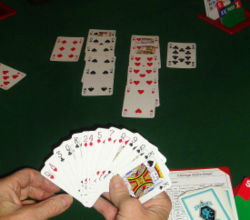Bridge (card game)
|
Bridge declarer play
|
|
| Alternative names | Bridge |
|---|---|
| Type | Trick-taking |
| Players | 4 |
| Skills required | Memory, , probability, communication |
| Cards | 52 |
| Deck | French |
| Play | Clockwise |
| Card rank (highest to lowest) | A K Q J 10 9 8 7 6 5 4 3 2 |
| Playing time | WBF tournament games = 7.5 minutes per deal |
| Random chance | Low to moderate (depending on variant played) |
| Related games | |
| Whist, auction bridge, duplicate bridge | |
Contract bridge, or simply bridge, is a trick-taking game using a standard 52-card deck. It is played by four players in two competing partnerships, with partners sitting opposite each other around a table. Millions of people play bridge worldwide in clubs, tournaments, online and with friends at home, making it one of the world's most popular card games, particularly among seniors. The World Bridge Federation is the governing body for international competitive bridge, with numerous other bodies governing bridge at the regional level.
The game consists of several deals, each progressing through four phases. The cards are dealt to the players, and then the players auction or bid to take the contract, specifying how many tricks the partnership receiving the contract (the declaring side) needs to take to receive points for the deal. During the auction, partners communicate information about their hand, including its overall strength and the length of its suits, although conventions for use during play also exist. The cards are then played, the declaring side trying to fulfill the contract, and the defenders trying to stop the declaring side achieving its goal. The deal is scored based on the number of tricks taken, the contract, and various other factors which depend to some extent on the variation of the game being played.
Rubber bridge is the most popular variation for casual play, but most club and tournament play involves some variant of duplicate bridge, where the cards are not re-dealt on each occasion, but the same deal is played by two or more different sets of players to enable comparative scoring.
One theory is that the name bridge has its origins in the name of an earlier game. Bridge departed from whist with the creation of in the 19th century, and evolved through the late 19th and early 20th centuries to form the present game. The word biritch itself is a spelling of the Russian word (бирчий, бирич), an occupation of a diplomatic clerk or an announcer. However some experts think that the Russian origin of the game is a fallacy.
...
Wikipedia

